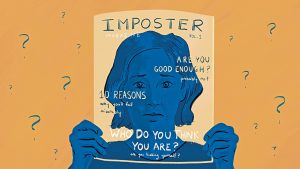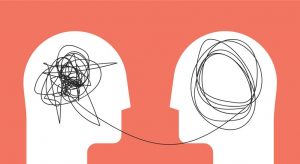Imposter Syndrome: Am I a “Fraud”?

Imposter Syndrome: Am I a “Fraud”?
“Did I really earn this or succeed as a result of luck?”. There is a great chance that you had asked this question to yourself. Think about one of your accomplishments until today. Have you ever felt like you do not have the qualifications for your achievement? This question is very common among us. If we dig deeper, we can understand the psychological reason behind this.
Imposter syndrome is believing that you are not as knowledgeable or intelligent in contrary to others’ beliefs, and they will eventually learn the truth about you. What is the cause of the feeling of being a fraud? The most influential thing is our personality. Some of our personality traits, as perfectionism or neuroticism can be associated with imposter syndrome. Perfectionist people tend to think that they need to complete every task in a perfect way, and people who are high in neuroticism tend to be anxious or self-doubt.

(credit: pricestudentblog.com)
Especially perfectionism is thoroughly related to imposter syndrome. Perfectionist people either procrastinate their tasks for not having the possibility to fail or overprepare for their task for getting them done perfectly. About the second case, this feeling could lead us to feel anxious and unskilled.
There are also other types of imposters. Two of them are more common than others. The first one is related to thinking, if you were able to learn new skills with little effort for your whole life, you would feel that processing new information in a short time is necessary for you. This would lead you to think that having difficulty in learning a new skill or failing in your first attempt makes you feel embarrassed.
The second one is to think that you can complete or achieve everything you intend to. For instance, you could be trying to be the best friend in your group, the best student in your department, and the best child in your family. You most probably would push your limits and struggle when you try to divert your energy to your roles. Despite the effort, the feeling for the need to do better could still be there.

(credit: bananatag.com)
This issue of having dissonance between your self-perception and how others see you could be harmful to your emotional well-being. As a result of thinking that you are not enough for your achievements, you incline to cover your shortcomings or try to be deserving of your success.
If we feel like a fraud, can we shale this feeling off? There are things we could try to do if we are having issues due to imposter syndrome. First things first, we need to try changing our mindset. We could try to increase the feeling of belonging and believe that we have the skills for our achievement.

(credit: edexec.co.uk)
Imposter syndrome affects our potential to grow and learn. The reason is that when we feel like we should hide our shortcomings prevents us to learn from our mistakes and have self-compassion. Having self-compassion is important because it helps to acknowledge, accept, and learn from our shortcomings.
You could talk to the person who made you aware of your imposter syndrome. This would be helpful for recognizing unnecessary “being a fraud” related thoughts. Also, you could find or remember the area or the thing you do best in and try to change your mindset about yourself. Last but not least, always remember that nobody is perfect!
Source:
Abrams, A. (2018, June 20). Yes, impostor syndrome is real: Here’s how to deal with it. Retrieved April 24, 2021, from https://time.com/5312483/how-to-deal-with-impostor-syndrome/
Feel like a fraud? (n.d.). Retrieved April 24, 2021, from https://www.apa.org/gradpsych/2013/11/fraud
Raypole, C. (2021, April 16). You’re Not a Fraud. Here’s How to Recognize and Overcome Imposter Syndrome. Healthline. https://www.healthline.com/health/mental-health/imposter-syndrome#types








very useful article for the ‘fraud’ moments